#appliedtheatre
Photo

Living in Japan changed my perspective on my arts practice. Their wellness culture is incredible to experience.
1 note
·
View note
Text

Drama is often classified as the art of collaboration. It's used in groups of mixed ability because it can act as a bridge for those with special needs alongside their peers. In essence, enabling people with difficulties and differences to work together. Creating a new form of relationship.
However. One thing. In my opinion, that mindset comes the danger of assuming that drama is 'the inclusion subject'. This can devalue the contribution theatre brings to any form of academic work.
For example, it can lead down these roads:
- A devaluation of the achievements of all drama students due to it being an 'easy' subject for all
- The mis-teaching of drama as always accessible and achievable.
- The view that the arts do not require basic skills/talents or any work to develop
- The segregation of students with additional/special needs who do not find drama lessons automatically accessible and intuitive.
None of this is beneficial for those with special needs; it's safer to come in with a fresh mindset based off of the individuals. Especially as drama can be a very personal artform that helps people grow.
0 notes
Text
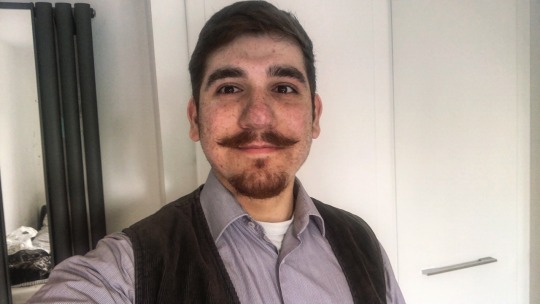
💜
0 notes
Photo
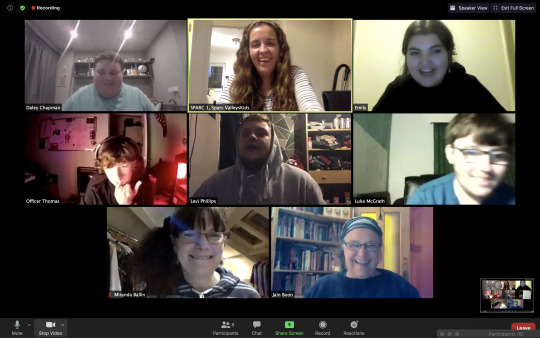
During my module, I had the absolute pleasure of working with Sparc and their Penygraig Youth Theatre and I’d like to publicly thank them for being so inviting and allowing me to run the workshop with them. Before we go any further, I would love to tell you about the incredible work that this group gets involved with. Penygraig youth theatre is a weekly drama group that takes place every Thursday and is for people between the ages of 14-18+. The current sessions run online via zoom; space where they can support one another, have fun and develop their drama work. Recently, before we went into the group they had been working in a fictive context, creating role-plays about an ominous pirate ship and its journey throughout sea and land. You can also check out more about the guys at Sparc at https://sparc.wales/en/about-sparc/projects
0 notes
Text
Does Drama Really Matter? Are you having a laugh?
I'm not here to bang on about EBAC proposals or defame another Tory MP, but I have seen article after article this year answering the question 'Does Drama Really Matter'? Why are we even responding to a question that is so distinctly rhetorical. Ask Google. It also wonders 'Does theatre matter'? Lists the even worse 'Why does theatre matter to you'? Follows with 'Does theatre even matter'? and the aggravating 'Why does theatre education matter'? Siri led me to an article entitled 'Drama Matters: Does It?' Of course these links mostly lead to articles, blogs and videos from advocates of drama, but posing the question in itself suggests the possibility that it doesn't. Isn't it time to stop entertaining the negative altogether, when the positives are so clear to see in any good drama education, inside or outside of school.
Let's change the question. Can I suggest a few.
What would the world be like without the arts? Answer - Even Worse.
What life skills can be learnt through the arts? Answer - Most of them.
What six day a week mundane jobs can be relieved between clocking off and the next impending shift by the arts? Answer - all of them.
Additionally, while I think about it... What incredible affects can the provision of arts training have on our young people?
Maybe that's the one we should be asking.
For decades, leading drama providers for young people use the phrases 'have fun', 'develop confidence', 'realise potential', 'make new friends' and in recent years we've started to add 'develop life long skills' and 'explore creativity' to our websites and snapchat stories, as we attempt to combat a politically induced stigma surrounding the arts. But it's never been enough. Do we need to try a little harder? As arts providers, it's been made clear to us, that as wonderful as these benefits to participants are, the government, and an increasing number of parents, don't think it's enough. And maybe, maybe... sometimes it isn't. If we are using great teachers, providing arts classes at the very best level, then we are providing all these transformative skills, and additionally, much much more, that even more importantly, is incredibly relevant to the problems currently facing not just our young people, but our society today.
Don't get me wrong, as the principal Applied Theatre practitioner at one of the UK's foremost performing arts schools for young people, I'm as guilty at the next school's social media marketeer. In the paragraph above, I probably just paraphrased my own last Instagram post, set under a couple of really smiley children having incredible value for money. It's difficult to start including #grit and #criticalthinking when it's hardly going to get the parent down the road to click on a pirate adventure day. This is definitely not happening overnight.
I'm not pretending here that I'm at the forefront of critical engagement within the provision of arts. Far from it. I spend most of my time teaching, while incredibly educated researchers are putting in hour after hour of tremendous work to try and prove the worthiness of the arts to the non-believers. But that doesn't mean I can't do my bit at this level. Let's be honest, after school and weekend performing arts schools are where this all starts for so many. It is a massive stepping stone in the struggle to prove impact and sustainability in the arts. So it's important that we get it right. We know that teaching children a song and dance number from Oliver can boost confidence and co-ordination skills, AND if the choreography leans far away from the original, we're even boosting creativity. Children have fun performing 'A hard knock Life' and they can improve their vocal skills, but start to talk about the orphans situation in the correct way, AND we start to include empathy in the process, something which naturally declines in the adolescent brain. At Bodens, we have belief in increasing our student's grit and determination. Already articles suggest it has no effect on academic achievements (Daily Mail.. does that count?) while suggesting perhaps it is more useful after the age of 16. What does that mean? How is that a negativity? Aren't we building students up to achieve and keep on achieving throughout their lives. Apparently not. Just up to the exams. Even if that were the case, isn't it already established that drama helps students achieve in other subjects? Or should I save that for another question? Does drama do anything?
So we need the drama to compliment the rest of the education. The Maths, English, Science etc. are an incredibly important part of who our young people become, and so is the drama education. Emphatically. I once worked at Toys R Us with an A Level student. He had four of the things. All A grade. Couldn't sell a 'Cozy coupe' to a toddler though. Maybe not the most important thing in the world, but he also failed to talk warmly to a customer, make eye contact, understand the social perspective of a young black girl's parents wanting a black barbie (this was 1990 and change was on it's way). And to be honest... cozy coupes usually sell themselves.
Anyway. Getting back on track...
Bertolt Brecht spent a lifetime challenging audiences to think for themselves.Our young people are facing a spiral of fake news in their feeds and have to be able to think for themselves... something which many subjects are actually steering away. You can't get much further from critical thinking than a Scholastic Aptitude Test.
Brazilian Practitioner Boal works to heal communities, surely there is a place for his teachings within our own fractured towns. Starting with the next generation is usually a good idea.
It was 1942 when Russian Practitioner Michael Chekhov specified his acting teachings were most probably for the actor of the future. Well here we are, and his techniques centre around focus, being in the moment and spiritual awareness. If you ever wanted mindfulness away from a smartphone app, there it is right there.
These are merely a few examples demonstrating what the arts can offer in school, after school and at the weekends, alongside having fun and making really good theatre. But you have to have the right teachers to do it. The danger is that by this continued dismissal of arts education impact, and a lack of schools and funding providers taking the subject as seriously as they should, we are losing amazing drama teachers on a daily basis. Of course there are a plethora of young performers willing to turn their hand to teaching until the next acting job arises, and they do bring an amazing inside knowledge of the industry to their classes (something which we always try to include at times throughout the term) But they are not actually teachers armed with the knowledge of what the arts really can do for our young people. What the arts can really, really do for them in the right hands, with the right backing. That's what we need to be going on, in school, after school and at weekends.
After I completed my MA in Applied Theatre at Royal Central School of Speech and Drama, I found myself left with this question... If we can make really great theatre with young people, teaching them to act, sing, dance and realise their potential, and alongside that have an opportunity to impact on the rest of their lives: transferable skills, how they see the world, truly thinking for themselves, grit and determination, mindfulness, acceptance (personally can't abide the word tolerance) and the ability to perform in the real world as themselves... then why would we not make the most of it?
At Bodens performing arts, our fully qualified teacher's also have training along the way, at every level of teaching, to ensure they make the biggest impact they can. It's not always easy, and it demands planning and passion that is admittedly 'possibly' easier to sustain in a privately funded school where our hands are maybe not as tied.
We need the arts to be backed as the serious subject that it is, so seriously good teachers are teaching it, and the impact is as powerful as it can be. All over the UK there are pockets of amazing performing arts schools with incredible teachers working their magic on the future of your young people, and within schools up and down the country, drama teachers worthy of a Robin Williams film, with their backed departments, are having incredible success both within the teaching of the curriculum and the transformative powers their classes can have. We need to shout out about these teachers, embrace them and embrace the arts in and out of our schools. So let's stop discussing if we need the arts and spend more of our time on why. Because that matters.
#dramamatters#dramaschool#dramatraining#dramabenefits#drama#actingclasses#actingschool#actingtraining#bodens#bodenscollege#performingarts#performingartsclass#Afterschool#sing#act#dance#appliedtheatre
0 notes
Photo
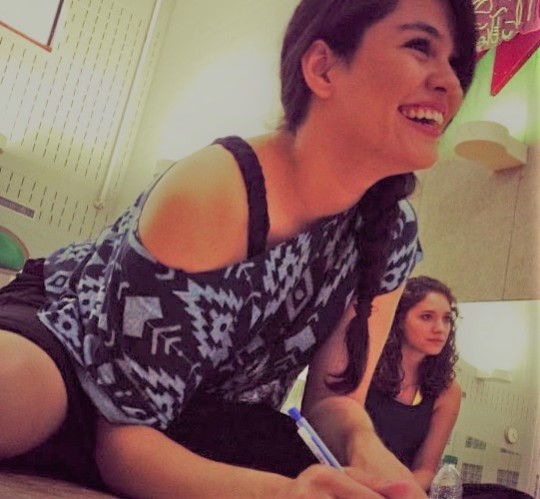
ALUMNI SPOTLIGHT SERIES : JULY
Radical Joy – Brisa Areli Muñoz (‘13) on Pedagogy, The Public, and Applied Theatre
Interview by Michael Wilson (’11)
Brisa Areli Muñoz co-created Thirteen O’Clock Theatre in South Texas in 2008 and moved to New York for the MA in Applied Theatre in 2011. She served as an Associate Program Director at the CUNY Creative Arts Team and took courses in Organizational Change Management at The New School, on her way to The Public.
Let’s start with a theatrical moment that just won’t leave your imagination, from anytime in your life. What comes to mind?
Ooh, that’s good. I worked on this project called the Food Project in 2014, in collaboration with company members from Thirteen O’Clock Theatre. The Food Project was inspired by a Washington Post article “Too Much of Too Little” by Eli Saslow. This piece cited the Rio Grande Valley as the poorest and fattest place in the nation. Our original participatory production sought to explore the circumstances that contribute to these statistics through conversation with audiences and the expertise of stakeholders in the region such as farmers, doctors, economists, health practitioners, and artists.
In one scene entitled “Food Medley” actors performed 1-minute original songs comically depicting their personal relationships to food. Afterwards, these same actors broke out into the audience to have small group discussions. Audience members were sitting at picnic tables, and actors asked them to look at the “menu” in front of them, a piece of paper with a plate, knife, and fork drawn on it. “Draw what you eat on a weekly basis on the inside your plate, and on the outside of your plate, write what circumstances lead you to select those food options.” A son and a mother got into a private conversation about why pizza was on both of their plates. The young son, who must have been six, said, “mom you always get pizza but my school says you should eat greens too.” And the mom turned to the son and said, “I only get you pizza because it’s the only place that I have time to stop by between my jobs when I pick you up from school.” And then, of course, as an attempt to comfort her he says, “it’s okay mommy, I like pizza, I like it.” But then she turned to him and said, “no, thank you for telling me. I’m gonna think about where else we can get you food.” Unfortunately the reality is, in many situations, access to fresh food is not easy, hence the reason we sought to provoke conversation and mobilize action through this event where food was provided and programming was free. But that was it. Those totally human moments of discovery are theatre, aren’t they? Theatre is just a representation of humanity…it’s a recreation of humanity.
And what are you doing at The Public Theater?
I’m in a program called Public Works, as Manager of Community Partnerships. The program partners with organizations across the city, to bring people together to build theatre capacities. We work with Military Resilience Foundation—so with veterans—with elders at Brownsville Recreation Center, Fortune Society, we work with Dreamyard up in the Bronx, Domestic Workers United…I support the teaching artists and the curriculums they’re building, and, as a teaching artist, I teach the intergenerational class, at the Center for Family Life in Sunset Park.
There’s a culture that’s a part of the program: the “spirit”, as I’ve been best able to name it, is that of radical joy. Systems of oppression are so alive in the experiences of so many people living in New York. Public Works attempts to create the space where we can simply be in community with each other and be joyous and make theatre together, and really be recognized by an institution, The Public, for the value that each of these members brings.
So that is radical.
It is. And I don’t experience those spaces very often. I used to think you couldn’t get to the joy without working through the pain. And what I’ve been able to see is that if you put joy at the center, that’s a way into the pain that’s not about having to move through it.
Would you tell me a story that gets at that joy you’re talking about?
Absolutely! This intergenerational class is a great example. We have a mix of English, Spanish, and Mandarin speakers in this group, and we have all ages: our youngest member is five—Aiden, he is INCREDIBLE.
On session eighteen of twenty, I sent them away to devise, in their age groups. The most theatrically exciting piece was from the group that had straddled between nine and eleven, in their corner doing their thing…and Aiden, the five-year-old. They were sneaking in the night to get the cookie jar. You see them in the dark creeping toward something. Then the light turns on and they get super scared and someone playing the mom voice is like, “what are you doing down there?” They’re like, “NOTHING!” She falls back asleep, then they chant, “cookies, cookies, cookies, cookies!” They get to the cookie jar, but then it’s twenty feet tall, so they pile on top of each other and put the five-year-old on top, and reach for the cookie. It was so fun to watch because they were playing with levels, with scale, with character, with storytelling, with all of it.
They so naturally understood how to make exciting theatre, all on their own—I was just there to make sure they didn’t fall. Meeting every week and creating from their mind builds their capacity to do this work. It’s not about that I’d taught them anything, but that I put the framework out there for them to create within. This is what freedom looks like: chaos. You know what I mean? Utter chaos. And joy, and energy, and commitment. Everyone committed to making a piece of theatre.
You talked about this as radical joy, and you talked about going to the joy first, and, what you just described has analogies to politics. Sneaking in perilous situations to get to the cookie jar…
Brisa: 100%. The one that the 8-year-olds did took place at the Statue of Liberty, and they decided that they were in prison and one of them had escaped. People who were standing around, pedestrians at the statue of liberty, saw that the cops were looking for them, and decided that they would hide them. It was this joyous, “COME HERE! WE’LL HIDE YOU!” And they hide behind one of them, or hide behind a chair. Meanwhile, this little girl is standing on a stool holding herself up like the statue of liberty the whole time, kind of watching it all. You know what I mean?
It’s symbolic, and resonant of immigration. And what you just described goes back to pedagogy. This was successful because you created structures for them to create inside, whatever—
—whatever they wanted it to be. Absolutely. Absolutely.
I had such a great learning experience in the MA program. I came at a time when I was so young…I mean, I still am…but I was 22! And I had come from an organizing background. My whole time in the MA in applied theatre, it was theory, me trying to wrap my head around the theory, not recognizing the ways I was already doing it in practice. And so I’m finally at the point, now, eight years after I first entered, where I see they’re in conversation with each other. It’s no longer just theory. It’s my practice.
You love to create the opportunity to pause, assess what’s going on, individually, in a community, in society, and then choose possibilities, new actions—
Yeah. It’s learning. I am so curious about people and their experiences. The only way we’re able to create joy is if we hold space for each other: to play, to explore, to learn, and question, and provoke, and all these things theatre has the inherent ability to do. And so much of it has to do with de-stigmatizing and de-constructing what it means to do theatre.There is so much theatre out there that is inaccessible, or “not about my story,” or, “fun to watch, but doesn’t really make me think so hard,” and it makes people question arts capacity to stimulate curiosity. In so many ways I’m asking, “well what do you think theatre’s capacity can be? In what ways are you served, are we served, by thinking about it differently? In what ways are the communities we live in served by thinking about it differently?” And to get at that conversation through play, what’s better?
0 notes
Photo
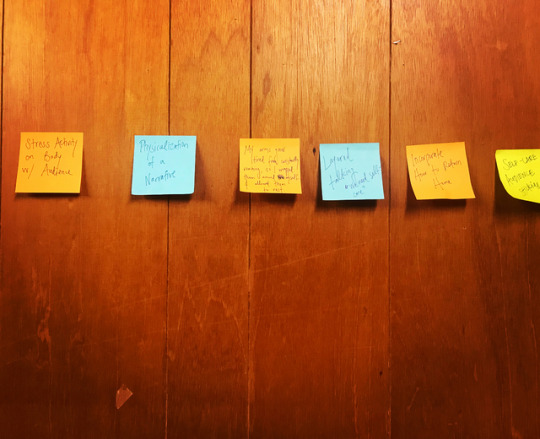
Sticky notes on sticky notes @artistsfromsuburbia #selfcare #devisedtheatre #appliedtheatre (at West Bridgewater, Massachusetts)
0 notes
Photo

『卡夫卡的七個箱子』 聽就聽得多 尤其是卡夫卡呢個名 因為好多時講起存在主義 就會講起佢 看完這個編作劇場 就不禁想起初次帶領既Devise 係幾咁甩轆 一套戲裡每個演員都要貢獻 都知自己做緊乜係一件樂事 (其實做人都要。。) 咁岩睇戲又見到同學仔 可惜Ka lam要工作 唯有同盧 dadu 影啦 #kafka #devise #appliedtheatre #schoolmate
0 notes
Text
WGN News at Piven’s Cook County Jail Classes
One of our newest ensemble members, Dre, wrote about the experience of being filmed in class last week.
We play, we laugh, while surrounded by lights.
We learn – we learn about each other’s likes.
Today Linda joined; I like her a lot.
I love when we laugh and play Zip, Zap, Zop.
Today WGN was here
To see how powerful our ensemble is.
I hope they enjoyed it – our laughs and our games.
To share with the world how Piven Theatre can come to a jail,
And free young women – not physically, but mentally.
0 notes
Photo

So honored to get to facilitate a four hour long Theatre of the Oppressed training yesterday. I worked with teachers on how to utilize image theatre/forum to start processing challenging issues in an interactive way. Can't wait to do it again! #theatreoftheoppressed #boal #freire #pedagogyoftheoppressed #facilitator #educator #educationforliberation #interactivelearning #collaborate #training #professionaldevelopment #appliedtheatre
#training#freire#boal#professionaldevelopment#appliedtheatre#theatreoftheoppressed#educationforliberation#facilitator#pedagogyoftheoppressed#collaborate#educator#interactivelearning
0 notes
Text
Chetnaa Mehrotra Founder of Rangbhumi - A Happy Playground - Perfect Woman Of The Day
Chetnaa Mehrotra Founder of Rangbhumi – A Happy Playground – Perfect Woman Of The Day
Most Talented
Acharya Chanakya award for my contribution in the field of Applied Theatre in Education.
Thank you so so much Rachna and Fun2Learn.
Amazing initiatives and amazing work .
Gratitude to the Universe . ✨✨✨
Chetnaa Mehrotra Founder of Rangbhumi – A Happy Playground – Perfect Woman Of The Day
#perfectwoman #perfectwomanteam #chetnamehrotra #appliedtheatre…
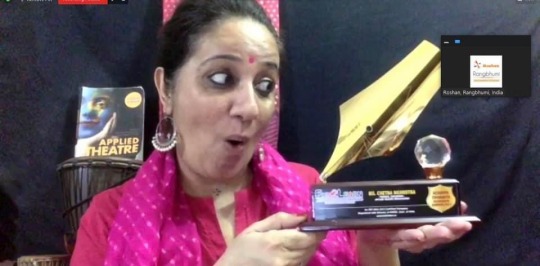
View On WordPress
0 notes
Text
Applied Theatre Practice
Hello guys, the following blogs post will be taking you through my journey on the Applied Theatre module I’ve been studying at the University of South Wales. I will be reflecting on a community-based workshop I planned and delivered in cohort with Emily Evans, I will be handing out advice and knowledge that will enable you to become a good facilitator with reference to some great facilitators who have been in the industries for decades now. And finally, I will be conducting research into an applied theatre company to give you an insight into the values in and around applied theatre.
0 notes
Photo
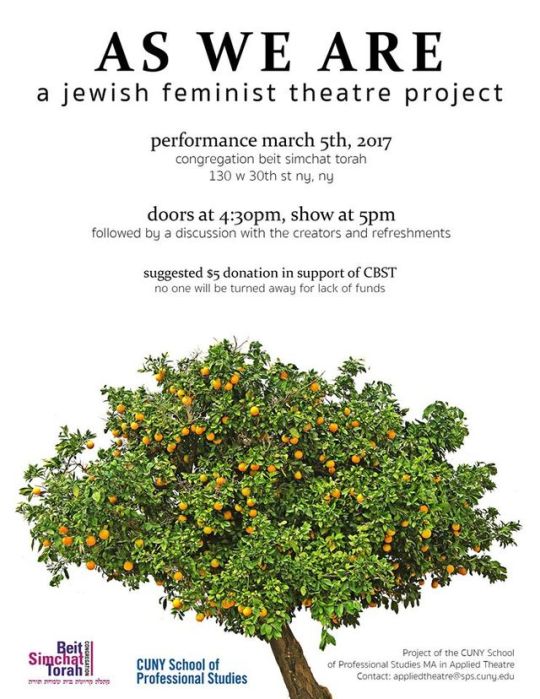
What does it mean to navigate the world as Jewish women and femme people? How do we relate to our inherited Jewish traditions and narratives? How do we experience different kinds of Jewish community today? How do our other identities shape our experiences as Jewish women and femme people?
Over of the course of nine weeks, participants in this project have been exploring these questions through theatre, ritual building, movement, writing, and discussion. We are excited to share our discoveries with you! This performance piece offers a glimpse into our creative journey.
Co-created by: Rachel Abrams, Naomi Blakeman, Lisa Borten, Emily Dall'Orso, Jennifer Ferentz, Nora Isacoff, Halle Kananack, Rachel Karpf, Tammy Kremer, Lizzy Marmon, JessAnn Smith, Elyse Steingold, Emily Wexler
Directed by: Rose Ginsberg, Allison Lerman-Gluck, Ariel Warmflash.
Who: An ensemble of Jewish women and femme folks from across the NYC-area
What: Join us for a performance followed by a dialogue with the co-creators and a nosh! Suggested donation of $5 to benefit our host, CBST. (No one will be turned away for lack of funds.)
Where: Congregation Beit Simchat Torah, 130 West 30th Street, New York, NY
When: Sunday, March 5th, Doors at 4:30PM, Performance at 5PM
Rose, Allison, and Ariel are MA in Applied Theatre candidates at the CUNY School of Professional Studies. This performance is the culmination of our thesis research project. Contact [email protected] for more info.
0 notes
Link
I made a website! Check out my blog, photos from past projects, and all that good stuff here.
0 notes
Photo



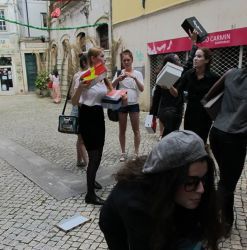
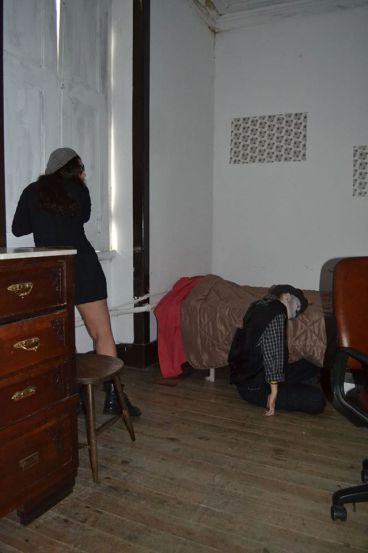
TEATRO DE INTERVENÇÃO
Rua dos Sapateiros e Salão Brazil
STREET APPLIED THEATRE and INTERNATIONAL ARTISTIC SEMINAR
This play is part of the project LINHAS CRUZADAS, that brings together four cultural associations from Coimbra – O Teatrão, Jazz ao Centro Clube (JACC), Círculo de Artes Plásticas de Coimbra (CAPC) e Casa da Esquina – and promotes activities for all this diferent areas, in order to offer the Coimbra’s public a new space for criation, experimentation and arts development.
Director
Isabel Craveiro
Assistent Director
João Santos
Cast
Classes d’O TEATRÃO, Bando à Parte
Coimbra joins North and South Europe with a seminar "Community Intervention in Urban Areas" organized by The Theatrão together with four European partners. The international seminar counts, in addition to the Theater, with European structures linked to artistic education and work with young people and will take place from next Saturday, June 28, until July 3 in Coimbra.
The initiative brings to the city about 40 young people who will discuss with artists, politicians and researchers and propose strategies of intervention and transformation of degraded urban areas.
From Italy comes a group that collaborates with the Theater since 2010 AMAT-Associazione Marchigiana Attività Teatrali, cultural programmers of various Italian theaters, as explained at a press conference held this morning at the Municipal Theater Office, Cláudia Pato de Carvalho, a Element of the direction of The Theater.
From Austria comes an organization Szente Bunte Whane, responsible for holding one of the festivals for youth in the city of Horn. From Belgium of the city of Antwerp, comes the Hetpaleis group. From Amsterdam Holland arrives Theatermijn, a group that reflects on the divisions that exist between "the districts of a big city".
The students of the Pedagogical project of the Crossed Lines called cbr: Lines Art Lab will represent Portugal in the international seminar.
We remind you that this is a multidisciplinary artistic training project for young adolescents with a course already started in the artistic activity and was one of the 17 selected nationally for the Partis program of the Gulbenkian Foundation.
Isabel Craveiro, from the Direction of The Theatrical reveals that the space worked by the project was Rua dos Sapateiros and the connection with the Brazil Hall.
The participant in the project cbr: Lines Art Lab, Rita Sousa, explained what she discovered about "the centennial house" through Mr. Vilão, a Caravela shoe worker licensed in "street" by the University of Coimbra.
The work of the meeting aims at the end to construct the document "Youth Policies for Urban Spaces" to be presented to local and European political entities.
For the construction of the document, during the seminar there will be moments of reflection with experts, politicians, artists and academicians that include names such as MEP Marisa Matias, Judge Álvaro Laborinho Lúcio, Councilwoman of Coimbra City Council, Carina Gomes or Ivo Santos of the State Department of Sports and Youth.
The Seminar is funded by the Youth in Action Program.
0 notes